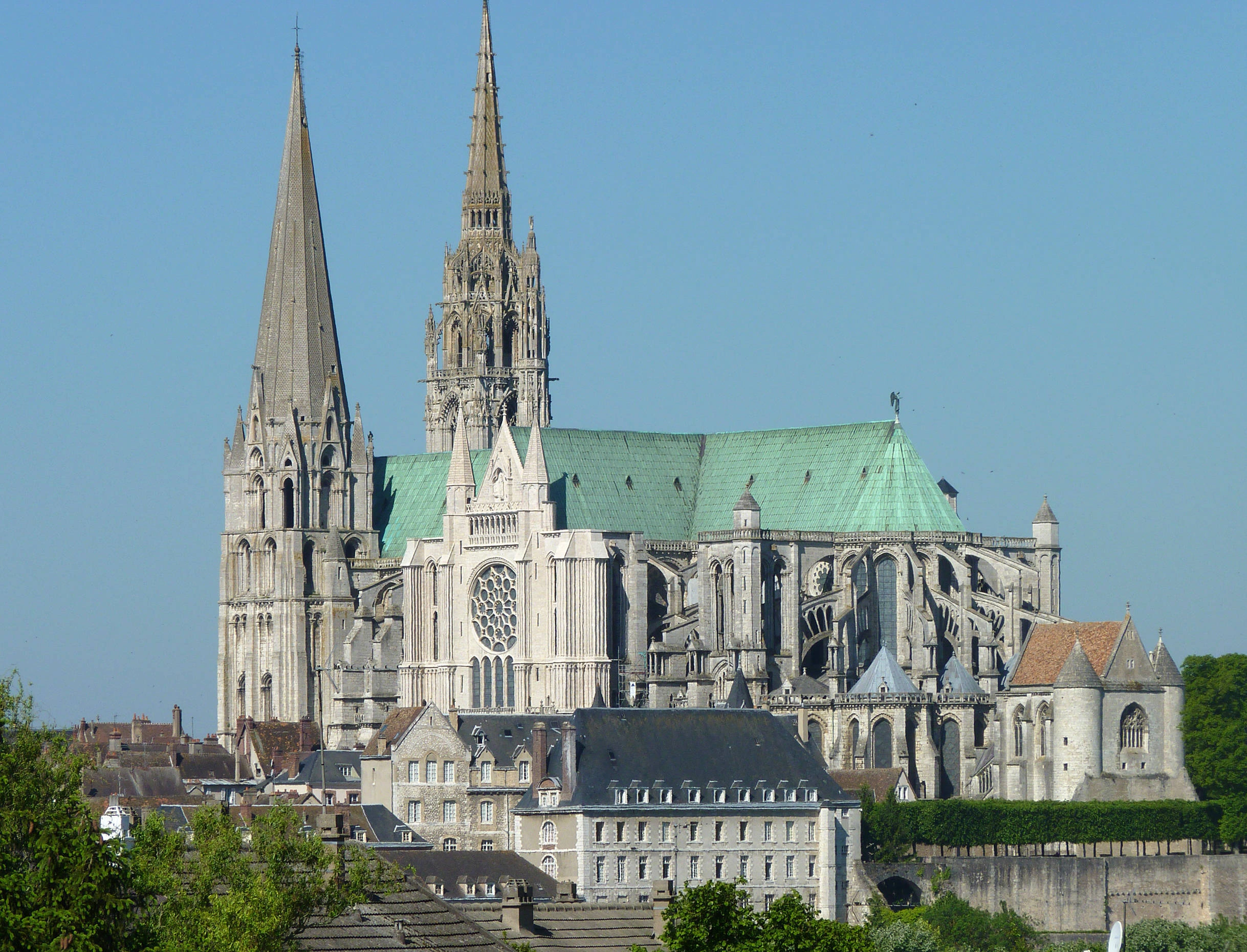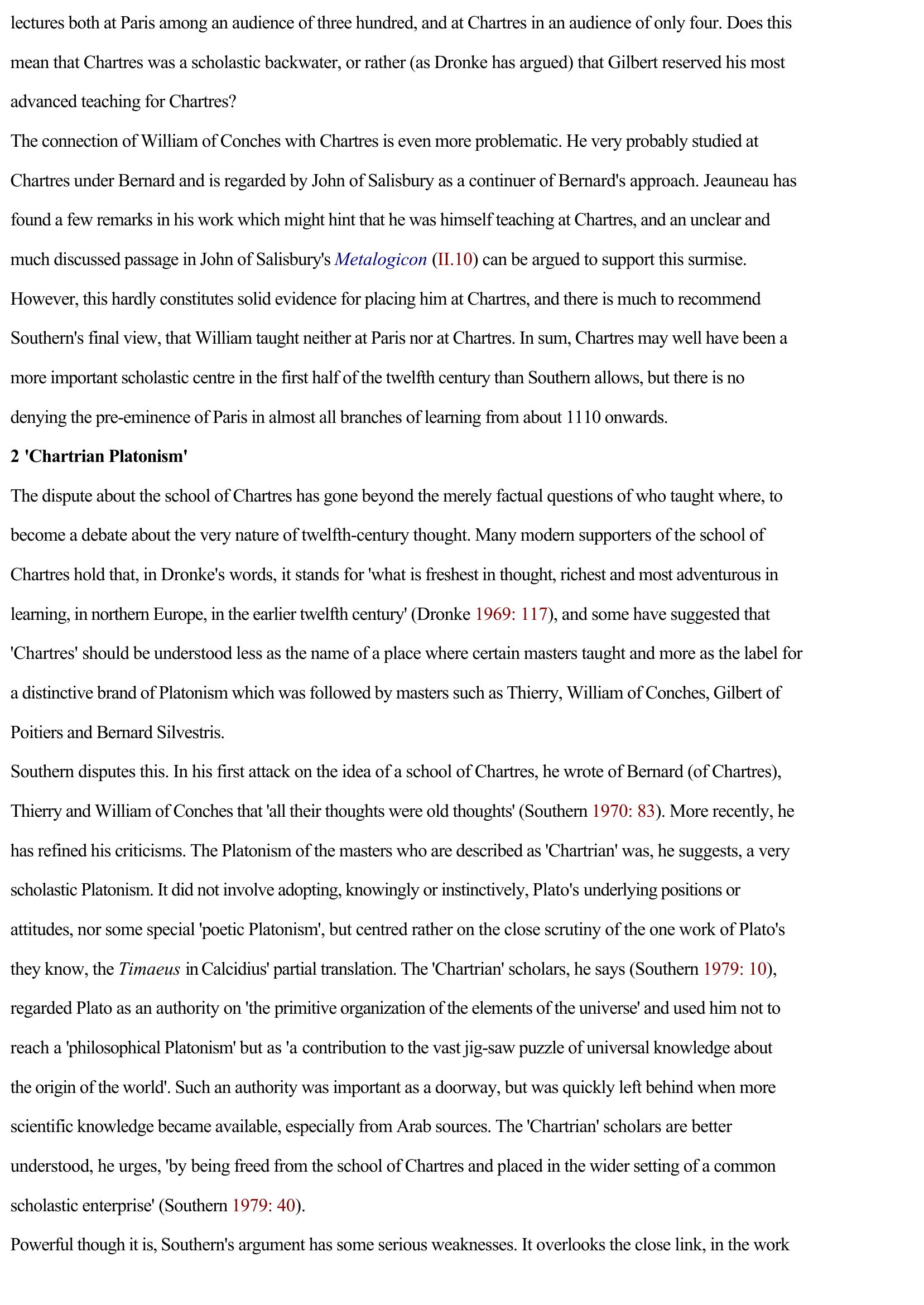Chartres, School of
Publié le 22/02/2012

Extrait du document


«
lectures both at Paris among an audience of three hundred, and at Chartres in an audience of only four.
Does this
mean that Chartres was a scholastic backwater, or rather (as Dronke has argued) that Gilbert reserved his most
advanced teaching for Chartres?
The connection of William of Conches with Chartres is even more problematic.
He very probably studied at
Chartres under Bernard and is regarded by John of Salisbury as a continuer of Bernard's approach.
Jeauneau has
found a few remarks in his work which might hint that he was himself teaching at Chartres, and an unclear and
much discussed passage in John of Salisbury's Metalogicon (II.10 ) can be argued to support this surmise.
However, this hardly constitutes solid evidence for placing him at Chartres, and there is much to recommend
Southern's final view, that William taught neither at Paris nor at Chartres.
In sum, Chartres may well have been a
more important scholastic centre in the first half of the twelfth century than Southern allows, but there is no
denying the pre-eminence of Paris in almost all branches of learning from about 1110 onwards.
2 'Chartrian Platonism'
The dispute about the school of Chartres has gone beyond the merely factual questions of who taught where, to
become a debate about the very nature of twelfth-century thought.
Many modern supporters of the school of
Chartres hold that, in Dronke's words, it stands for 'what is freshest in thought, richest and most adventurous in
learning, in northern Europe, in the earlier twelfth century' (Dronke 1969: 117 ), and some have suggested that
'Chartres' should be understood less as the name of a place where certain masters taught and more as the label for
a distinctive brand of Platonism which was followed by masters such as Thierry, William of Conches, Gilbert of
Poitiers and Bernard Silvestris.
Southern disputes this.
In his first attack on the idea of a school of Chartres, he wrote of Bernard (of Chartres),
Thierry and William of Conches that 'all their thoughts were old thoughts' (Southern 1970: 83 ).
More recently, he
has refined his criticisms.
The Platonism of the masters who are described as 'Chartrian' was, he suggests, a very
scholastic Platonism.
It did not involve adopting, knowingly or instinctively, Plato's underlying positions or
attitudes, nor some special 'poetic Platonism' , but centred rather on the close scrutiny of the one work of Plato's
they know, the Timaeus in Calcidius' partial translation.
The 'Chartrian' scholars, he says (Southern 1979: 10 ),
regarded Plato as an authority on 'the primitive organization of the elements of the universe' and used him not to
reach a 'philosophical Platonism' but as 'a contribution to the vast jig-saw puzzle of universal knowledge about
the origin of the world' .
Such an authority was important as a doorway, but was quickly left behind when more
scientific knowledge became available, especially from Arab sources.
The 'Chartrian' scholars are better
understood, he urges, 'by being freed from the school of Chartres and placed in the wider setting of a common
scholastic enterprise' (Southern 1979: 40 ).
Powerful though it is, Southern's argument has some serious weaknesses.
It overlooks the close link, in the work.
»
↓↓↓ APERÇU DU DOCUMENT ↓↓↓
Liens utiles
- Portrait de Mlle de Chartres
- Explication d’un extrait de La Princesse de Clèves, première partie, de « Mme de Chartres, qui avait eu tant d’application » à « quand on était jeune »
- Mme de La Fayette, La princesse de Clèves: Comment est mis en lumière le personnage de Mlle de Chartres ?
- ÉCOLE ET SOCIÉTÉ ou ÉDUCATION ET SOCIÉTÉ, The School and Society, 1899. John Dewey
- Les Tapisseries : « Présentation de la Beauce à Notre-Dame de Chartres »

































